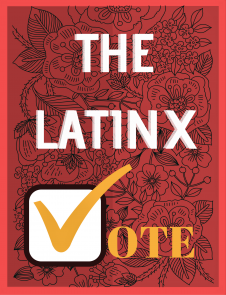Abortion rights, women of color, and LGBTQI+ people are under attack. Pledge to join us in fighting for gender justice.
Durante el Mes de la Herencia Latinx, Celebrémos con Registrando Más Votantes / During Latinx Heritage Month, Let’s Celebrate by Registering Voters

 Scroll down for an English version.
Scroll down for an English version.
Creciendo en la ciudad fronteriza de El Paso, Texas, estaba acostumbrada a ver a gente parecida a mí a todos lados que iba. De estatura baja, piel morena, pelo oscuro, y con un nombre que parecía sacado de una telenovela. No me sentía como una minoría. Hija de madre soltera y primera generación, la política nunca se discutía realmente en la mesa y no parecía ser algo que pudiera afectarnos directamente. Vimos al gobierno y la política como una idea muy alejada de nuestra pequeña comunidad.
Recuerdo la primera vez que mi familia participó en un acto cívico. Mi hermana y yo acompañamos a mi mama a ejercer su derecho a votar en el 2008. Lo único que sabía era que, por primera vez, había un candidato afroamericano postulándose para la presidencia de los Estados Unidos y queríamos ser parte de la historia. Realmente no sabía el impacto que su voto tendría en la elección, pero en ese momento, estaba extremadamente orgulloso de mi mama. Continué involucrándome brevemente en política, pero realmente no fue hasta la universidad donde me involucré en el compromiso cívico.
El sentimiento que tuve en el 2008 fue superado recientemente cuando emití mi voto por la primera candidata presidencial Demócrata, Hillary Clinton, en quien confiaba para luchar por mis derechos como mujer y latina. Los resultados de esa elección cambiaron el rumbo de muchas personas. Decidí participar activamente para educar a mi comunidad sobre temas que nos impactaban directamente. Comencé a trabajar como organizadora de campañas en una organización Latinx que se enfoca en la participación cívica entre los jóvenes. Ahí, me enfoque en registrar a votantes, apoyar a candidatos progresistas y organizar llamadas durante elecciones especiales.
Cuando comencé a trabajar en el compromiso cívico, me di cuenta de que el problema en nuestras comunidades Latinxs, era que nuestros jóvenes no recibían educación, no eran invitados a involucrarse y más aparte no había inversión en crecer su energía y motivación- especialmente con problemas que nos afectaban como personas de color. El factor principal que contribuye a esta apatía es que nuestras circunstancias no nos moldean para involucrarnos cívicamente en nuestras comunidades. Esto fue y sigue siendo principalmente debido a los escases de accesibilidad nuestros padres tienen, como las barreras del idioma y la incapacidad para dejar el trabajo o tener un horario de trabajo inflexible. Esto se ha cultivado aún más por la mentalidad de ver a la comunidad Latinx como extranjeros en lugar de primera, segunda y tercera generación de estadounidenses.
No debemos de asumir que los jóvenes no se preocupan por los problemas que nos afectan, como la atención médica, acceso a educación superior, trabajo, el transporte y la inmigración. Es por eso que es importante acercarnos a los jóvenes Latinxs y lograr que se interesen y se apasionen por estos temas. Los jóvenes son actores clave para cambiar el campo de juego político, ya que 803,000 de Latinxs cumplen 18 años cada año. Debido a que los Latinxs se enfrentan a mayores obstáculos para obtener servicios de atención médica, los Latinxs experimentan tasas más altas de cánceres reproductivos, embarazos no deseados e infecciones de transmisión sexual que otros grupos en los EE. UU.
Candidatos postulándose este año, se están enfocando en los 27,3 millones de votantes Latinxs elegibles porque 11,9% de los votantes elegibles en Estados Unidos son Latinxs y sabemos que este número solo sigue creciendo. Estamos en un momento de cambio y lo vemos cuando Latinxs se postulan para cargos públicos e involucran a otros Latinxs para votar. Candidatos como la juez Verónica Escobar que se presentará en mi propio distrito y muy probablemente sean la primera congresista latina de Texas.
Los jóvenes Latinxs deberían participar más cívicamente porque tenemos mucho en juego en este momento. Tomemos como ejemplo al juez nominado a la Suprema Corte de Justicia, Brett Kavanaugh; está nominado para un nombramiento de por vida y, por lo tanto, bien podría ser el voto decisivo sobre cuestiones críticas, como el derecho al aborto, la igualdad en el matrimonio y más.
Ayer fue el Día Nacional de Registro de Votantes y como parte del Mes de la Herencia Latinx debemos registrar más votantes que nunca. Estas elecciones son extremadamente importantes para las personas de color. Los jóvenes Latinxs no solo necesitan registrarse para votar, sino también presentarse en las urnas para emitir su voto. Como Latina, sé que nuestro voto no solo cuenta para nosotros, sino que representa todos los sacrificios que nuestra familia ha hecho para que tengamos estas oportunidades aquí en los EE. UU.
Growing up on the border city of El Paso, Texas, I was used to seeing folks that looked like me everywhere I went. Short, brown-skinned, dark hair, and with a name that seemed was pulled out of a telenovela. I did not feel like a minority. As a daughter of a first generation single-parent household, politics were never really discussed at the dinner table and it didn’t seem like something that could affect us directly. We saw the government and politics as an idea very far away from our small community.
I remember the first time my family engaged civically. My sister and I accompanied my mother to go vote in 2008. All I knew was that, for the first time ever, there was an African American man on the ballot to become President of the United States and we wanted to be part of history. That moment, I really didn’t know the impact her vote would have on his election, but in that moment, I was extremely proud of my mother. I continued being briefly involved in politics, but really it wasn’t until college where I got involved in civic engagement.
That feeling I got in 2008 was only recently surpassed when I cast my vote for the first female democratic presidential nominee, Hillary Clinton, whom I trusted to fight for my rights as a woman and Latina. The results of that election shifted the course for many, many people. I decided to become an active in getting my community educated on issues that had a direct impact on them. I became a Field and Campaign intern for a Latinx civic engagement organizations where I registered voters, canvassed for progressive candidates, and phone banked during special elections.
When I started working around civic engagement, I realized the problem with our Latinxs communities was that our youth weren’t being educated, engaged and energized when it came to the the issues that most affected us as people of color. The main factor that contributes to this apathy is that our circumstances do not shape us to be civically engaged. This was and continues to be mainly due to the lack of accessibility for our parents — such as language barriers and inability to leave work or an inflexible work schedule. This has been further cultivated by the mentality as seeing the Latinx community as foreigners instead as first, second, and third generation Americans.
We should not take for granted that young people care about issues, like health care, affordable higher education, employment, transportation, and immigration. It is why I believe it’s important to reach out to Latinx youth and get them engaged and passionate about these issues, because they are the key players in changing the political playing field, since 803,000 of Latinos turn 18 years old each year. Because Latinxs face greater obstacles in attaining health care services, Latinxs experience higher rates of reproductive cancers, unintended pregnancy, and sexual transmitted infections than most demographics in the US.
These candidates are targeting the 27.3 million of eligible Latinx voters because 11.9% is the projected percentage of all eligible voters who are Latinx and that number can continue to grow. Yes, today is a time for change and we see that when Latinxs themselves are running for office and engaging Latinxs to turn out and vote — candidates like Judge Veronica Escobar running in my own district and will most likely be Texas’ first Latina congresswoman.
Latinx youth should become more civically engaged because we have so much at stake right now. Take for example the SCOTUS nominee Judge Brett Kavanaugh; he is nominated for a lifetime appointment and thus may well be the deciding vote on critical issues, such as a women’s right to chose, marriage equality, and more.
Yesterday was National Voter Registration Day and as part of Latinx Heritage Month we must register more voters than ever before. These midterm elections are extremely important for minorities and people of color. The Latinx youth not only need to register to vote, but also to show up at the polls to cast their ballot. As a Latina myself, I know our vote not only counts for us, but represents all of the sacrifices our family has made for us to have these opportunities here in the U.S.





